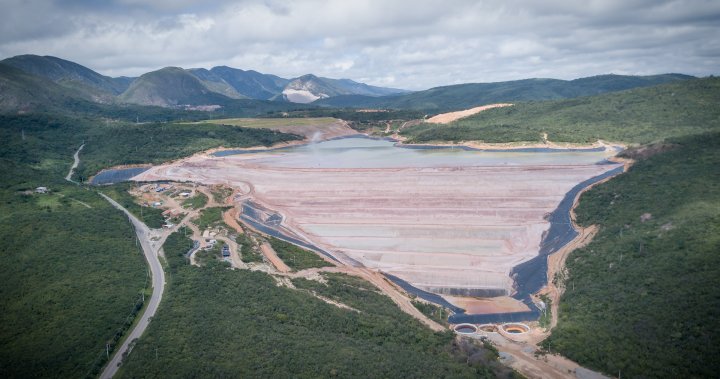WARNING: This story contains elements that may be disturbing to some audiences.Claudiana dos Santos has a nebulizer at her home in Itapicuru, a community in Bahia, Brazil, that sits near a major gold mine.“People in the community look for me a lot,” dos Santos, 36, said in an interview with Global News through a translator. “Here in the community, there is no direct medical care.”She explained that a steady stream of families have visited her for 15 years to use the nebulizer. The machine converts medication from a liquid into a mist that people can inhale to help them breathe.
Global News in Toronto interviews advocate Claudiana dos Santos, who lives near the Yamana mine in Jacobina, Brazil.
Dos Santos says a number of people in the region have developed respiratory problems such as asthma, sinusitis and other conditions after years of inhaling dust from nearby mining activity.The nearest hospital to Itapicuru, where she and her family have lived for generations, is in downtown Jacobina — 14 km away.“A lot of people develop allergies but they can’t get a report when they look for doctors in Jacobina to say it is caused by the dust,” dos Santos said. “When we say we are part of a community that features mining, the reports are generally denied.”The Jacobina mine has been in operation since the 1980s but Canadian company Yamana Gold Inc. has owned it since 2006. Eighty five per cent of the corporation’s workforce in Jacobina is local. In this August 2020 video, crews are working in Jacobina, Brazil, for Canadian mining company Yamana Gold Inc. Source: Thomas BauerThe silver-and-gold mining company, which has five mines throughout the Americas in what it calls “mining-friendly jurisdictions,” told Global News in a statement there is no detrimental impact from its mine’s activities in Jacobina.Yamana also disputes allegations from a report released by the state’s public prosecutor in 2017 that said the company contaminated a river. The report linked this alleged contamination to the deaths of animals that used the water as a source.
A 2017 report by the Bahia, Brazil, public prosecutor’s office includes this photo of dead chickens and claims Canadian mining company Yamana was responsible for contaminating a river that’s a source of water for animals. Source: State of Bahia Public Prosecutor’s Office.
Claims of this nature about the actions of a Canadian company operating internationally are not unique. Human rights advocates say there are a number of communities, including Indigenous groups, around the world that allege they are suffering similar abuses linked to Canadian companies from sectors that include the mining and garment industries.But allegations of this nature rarely get formally investigated in Canada.In 2018, Prime Minister Justin Trudeau’s government announced it would create a new watchdog that would have powers to investigate the overseas activities of Canadian companies, including the ability to force them to respond to questions and turn over evidence.But it later scaled back those plans following an “onslaught of mining industry lobbying that got them to change their minds,” said Emily Dwyer, the coordinator of the Canadian Network on Corporate Accountability (the CNCA), which represents a group of non-governmental organizations (NGOs), churches, trade unions and other civil society organizations.“It has been gutted,” Dwyer said.“The office today remains powerless.”
ShapeCreated with Sketch.
Read more:
‘Human beings are not bartering chips’ — Joe Biden calls on China to release 2 Michaels
The government also changed its plans despite paying a consultant, retired lawyer Barbara McIsaac, for advice about how to set up the new office called the Canadian Ombudsperson for Responsible Enterprise (CORE).McIsaac detailed two options that would allow the CORE to pursue investigations: by enacting a law to establish the CORE with these powers, which is the “preferable” solution she provided, or by appointing the CORE as a commissioner under the Inquiries Act.“Whether the CORE should have the power to compel witnesses or documents is a question of policy,” wrote McIsaac in her 2019 report, obtained by Global News.“However, it is fair to say that without a way to compel the cooperation of entities against which a complaint is made or others who may hold relevant information, the CORE’s effectivenessmay (sic) be compromised. On the other hand, a process which includes powers to compel runs the risk of becoming overly confrontational and caught up in procedural wrangling and Court challenges.”Former minister of international trade diversification, Jim Carr, would later tell Dwyer in a September 2019 letter that after reviewing McIsaac’s advice, he had concluded that the “most effective way” to ensure the watchdog had the powers it needed would be to enact a standalone legal framework and that he had instructed public servants to proceed with that plan.Trudeau replaced Carr in cabinet a few months later, after the latter was diagnosed with a rare cancer, and it is not clear what happened to the former minister’s instructions.
2:26First Nations communities suffer through tainted water crisis despite government promises
First Nations communities suffer through tainted water crisis despite government promises – Feb 18, 2021
When asked why the government opted not to give stronger powers to the CORE, the office of Small Business, Export Promotion and International Trade Minister Mary Ng referred questions from Global News to Global Affairs Canada. The department’s trade division told Global News in a statement that the government decided to adopt a “non-judicial mechanism” for the CORE because it considers this “to be more accessible, faster and cost-effective than other avenues.” Karyn Keenan, the director of corporate accountability group Above Ground, says she doesn’t believe this is the best approach. She had hoped the CORE would be an alternative for alleged abuse victims so that they could avoid lengthy and expensive court proceedings in Canada.“The CORE, as it stands right now, is not a meaningful mechanism for people to seek justice,” Keenan said.The Canadian government said Canada is home to half of the world’s publicly listed mining and mineral exploration corporations, and these companies had presences in 96 foreign countries in 2019 (down from 100 countries the year before).The issue of human rights abuses has also been top of mind for Canadian lawmakers recently as they voted on Monday to support a motion that formally recognizes China’s treatment of the Uyghur population as a genocide.
Read more:
Vote passes recognizing China’s treatment of Uyghurs as genocide
Eight claims containing allegations of environmental or human rights abuse related to the international operations of Canadian extractive companies (none involving Yamana) have been filed in Canadian courts, according to Above Ground. None of the cases, to date, have been decided in favour of the plaintiffs.“The courts are not a shoe-in for the courageous plaintiffs,” said Keenan of Above Ground.However, some overseas complainants have had victories. The Supreme Court of Canada ruled in February 2020 that a lawsuit could proceed against another Canadian mining company over activities in Eritrea. The parties reached a settlement in October.Meanwhile, lawyer Sheri Meyerhoffer, appointed as the CORE in April 2019, is still setting up her office and has not yet started reviewing any complaints.Meyerhoffer told Global News in an interview that she may be ready to start accepting complaints in March and that the allegations against Yamana are “potentially admissible” under her mandate but without knowing further details, she cannot comment.
1:52Canada backtracks on human rights commitment
Canada backtracks on human rights commitment – Feb 25, 2021
Trudeau’s Liberals had promised to create the watchdog during the 2015 election campaign. They followed through in 2018, when then-foreign affairs minister François-Philippe Champagne announced the creation of an office he described as the “first of its kind in the world.” At the time, he said it would have robust powers to, independently of the government, investigate allegations of human rights abuses linked to Canadian corporations’ activities abroad.A web page Global Affairs Canada published that year has since been rewritten, removing any mention of the ombudsperson being able to investigate.This would include “the compelling of witnesses and documents,” the site previously said.The page now says the CORE can “advise Canadian companies” on their practices and policies, “review allegations of human rights abuses” and “provide advice” to the minister of international trade.Ng’s office declined to explain why the website had been changed, but her department said the website had been updated to reflect the CORE’s mandate as stated in Meyerhoffer’s order-in-council appointment.Advocates say withholding these investigatory powers from the CORE means preventing Canada from getting to “the truth behind those abuses.”“Why would someone who’s impacted by a Canadian company overseas go through the trouble … and expose (themself) to bring a complaint to the CORE when they know the office can’t offer them anything, including an investigation?” Keenan said.
2:10In wake of public backlash, Alberta reinstates 1976 coal policy
In wake of public backlash, Alberta reinstates 1976 coal policy – Feb 8, 2021
Meyerhoffer told Global News that it would be easier for her office to assess the facts and make recommendations if it had the ability to compel testimony and documents.“Having said that,” continued Meyerhoffer, “there are other ways of going forward to get that information and we will be using all of those avenues to get it. And we’ll be doing the best we can with that.” She said her office can recommend that the international trade minister withhold existing and future support from Canada’s export credit agency, Economic Development Canada (EDC), to a specific corporation if it retaliates, refuses to comply with a review or holds information confidential. But ultimately, it’s up to the minister to enforce what she recommends, she said.EDC facilitated $13.7 billion in business in the mining industry in 2019, says its portfolio by commercial sector.
Read more:
Pandemic diplomacy — Trudeau to meet virtually with U.S. secretary of state
The agency told Global News that between 2008 and 2019, it made up to US$100 million available to Yamana and up to US$90 million for Kinross Gold Corp. between 2006 and 2019, but it did not give project financing to either the Paracatu or the Jacobina mine.“Every transaction EDC approves has undergone a rigorous due diligence process reflective of industry best practice and adheres to our international commitments,” it wrote to Global News.Commercial confidentiality prevents the EDC from releasing the exact amount companies draw on their credit facilities, the agency said in a statement.But human rights advocates like Dwyer maintain the CORE should have stronger powers that go beyond recommending financial sanctions to ensure that companies cooperate with investigations.“Canada should not be relying only on voluntary responses,” Dwyer said. “(The federal government has) proven in Canada and around the world to be inadequate and ineffective when it comes to redressing human rights abuses.”
Emily Dwyer of the Canadian Network on Corporate Accountability stands next to Parliament Hill in Ottawa for a Global News interview on Jan. 15, 2021.
Luigi Della Penta/Global News
The Mining Association of Canada disagrees, saying in a 2016 letter to the government that it “strongly opposes creating a semi-judicial mandate with investigatory powers.” The association told Global News that it maintains this position because it believes the office as it stands now can still play a useful role.According to the federal lobbying registry, the Mining Association of Canada lobbied Meyerhoffer at least eight times since the CORE was created, more than any other organization. It has also lobbied other government officials, including the offices of federal ministers and Opposition Conservatives, multiple times during that period, although it is not clear whether all of the lobbying activity was directly related to the CORE.“We have communicated that if the government were to consider a quasi-judicial approach, it should do so in an open and public manner with a discussion paper, options and legal considerations, which it has never done,” the association told Global News in an email.“There needs to be consideration given to how such powers can be effectively and fairly employed outside of Canada to non-Canadian entities such as third-party service providers, state actors such as security forces, government officials and community members to ensure the investigation is thorough and conducted fairly.”
Read more:
Fundraiser set up for young family of man killed in mudslide at B.C. mine
One of the most recent cases of communities abroad firing human rights allegations at a Canadian extractives company is in East Africa against subsidiaries of mining giant Barrick Gold Corp.Last August, more alleged victims joined a legal claim in U.K. courts against these subsidiaries for “serious human rights violations at the company’s North Mara gold mine in northern Tanzania.” The three new alleged victims claim security members guarding Barrick’s gold mine shot and killed members of their families.Barrick’s leadership blames Tanzania’s police for any wrongdoing, according to Forbidden Stories.When asked about the alleged killings, Barrick CEO Mark Bristow told the non-profit organization, “There have been many, many investigations on various allegations, and you can’t hold me accountable for the state authority.”Barrick Gold did not respond to Global News’s requests for comment via email about these allegations nor its take on the CORE’s mandate, but in the past, Barrick has condemned the allegations associated with its international operations, saying, “Barrick takes a zero tolerance approach to human rights abuses.”
1:21Caught on camera: Terrifying moment of Brazil dam collapse
Caught on camera: Terrifying moment of Brazil dam collapse – Feb 1, 2019
In one of the most tragic mining disasters in recent times, at least 259 people died after a dam, owned by a Brazilian mining company, collapsed in 2019. The people living near the Jacobina mine, including dos Santos, are afraid they are in danger of facing the same fate: drowning in toxic waste reaching as high at 26 feet in some areas, according to a Tricontinental report. The document claims that the people in Jacobina living near the mine are downstream of an upstream tailings dam, similar to the one that collapsed in 2019.A drone flies near a tailings dam belonging to Canadian company Yamana in August 2020 in Jacobina, Brazil. Source: Thomas BauerHowever, Yamana countered this, telling Global News its tailings storage facilities in Jacobina are not upstream-constructed facilities.“We have adopted best-in-class tailings governance practices that incorporate evolving international best practice on the technical and management aspects of tailings,” said Yamana in a statement.
An infographic on what tailings dams are. Artwork by Laura Whelan.
The company also said that it adheres to its own human rights policy approved in 2014 but failed to comment on the dust allegations specifically.“Yamana is committed to protecting the health and safety of all individuals affected by its business activities,” reads its policy.There is a similar situation happening in another Brazilian state, Minas Gerais, alleged sources connected to the Paracatu community, where Toronto-based company Kinross operates what it says is the largest gold mine in Brazil and one of the biggest in the world.Kinross has not been involved in any of the eight court claims that foreign plaintiffs have filed against Canadian extractives companies.
3:05Indigenous Services Minister Marc Miller says finances in place to end all boil water advisories
Indigenous Services Minister Marc Miller says finances in place to end all boil water advisories – Feb 25, 2021
One of the main concerns here, Above Ground says, is elevated arsenic levels in the community’s water.Arsenic metal rarely occurs in its pure form in nature — most arsenic is obtained as a byproduct in the treatment of gold, silver, copper and other metal ores, according to the Minerals Education Coalition.Exposure to moderate-to-high levels of arsenic in drinking water is associated with an increased risk of lung, bladder and skin cancer, among other conditions, says the World Health Organization.In a statement to Global News, Kinross pointed to two separate studies — one from 2016 coordinated by the National Institute of Science and Technology on Minerals Resources Water and Biodiversity (INCT) and another from the municipality of Paracatu in 2014 — that found the health risk from arsenic in the community is low.“There is no evidence of arsenic ‘contamination’ related to the Paracatu mine,” the company said in a statement. “Kinross maintains stringent environmental controls at the Paracatu mine, including a comprehensive network of water monitoring stations to ensure ongoing measurement of potential risk factors.”A way forwardMining companies such as Yamana and Kinross also say they have set up a variety of ways for people to register concerns or complaints and to do so anonymously.Yamana says it treats all concerns with the “utmost seriousness” and that local residents who are not comfortable reporting their concerns to the on-site grievance mechanisms can access its integrity helpline or use local judicial mechanisms, including the public prosecutor.Kinross said it has a similar space and hotline for local residents in Paracatu to contact the company.Meyerhoffer says her office is working on creating a complaints portal with interpretation services for people to submit concerns either by phone, mail or on the CORE website, and it will honour confidentiality. “If they don’t wish for it to be public because they’re worried about their own safety for raising an issue, we will not make it public,” she said. “The possibility of retaliation is something we take seriously and something we have put a whole framework around.”
Read more:
Coal scientist warns Albertans of contamination from mining
If a Canadian company involved in human rights abuse allegations refuses to comment on a case the CORE takes on, “it could be very much to their peril to not participate.“I’d be very disappointed,” the ombudsperson said. “They should want to mediate and try to resolve. Companies worth their salt will do that.”She said her office could come to a finding excluding the information a company withholds and make recommendations based on that.The CORE’S annual budget is more than $992,000, and it received a one-time amount of $650,000 for the 2020-2021 fiscal year from the departmental reserve, said Global Affairs Canada.In Itapicuru, dos Santos says while the community still has natural beauty, it has lost some opportunities, such as in the agriculture sector, because of the expansion of mining.“Our rivers and waterfalls … we cannot say it anymore but I grew up bathing in the river, visiting waterfalls, hiking,” she said.“The (worst thing) you see is that the authorities, (especially) the city … almost nothing is provided to our community.”When we asked dos Santos why she continues to push for change in her community, she said she was glad someone outside her “reality” is listening and caring about her story.“My fight is bigger than my fear.”— with translations by Leonardo Coelho and Alice LopesEditor’s note: This article was updated at 6:27 p.m. on March 4, 2021, to correct that some statements previously attributed to the office of Small Business, Export Promotion and International Trade Minister Mary Ng should have been attributed to the trade division of Global Affairs Canada.
Jasmine Pazzano
Source link



